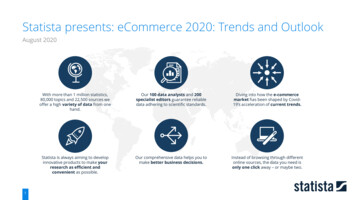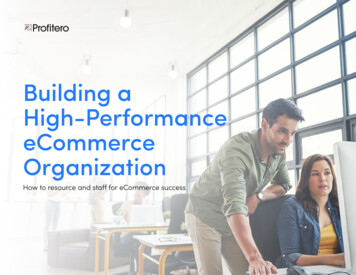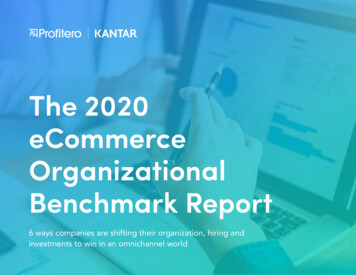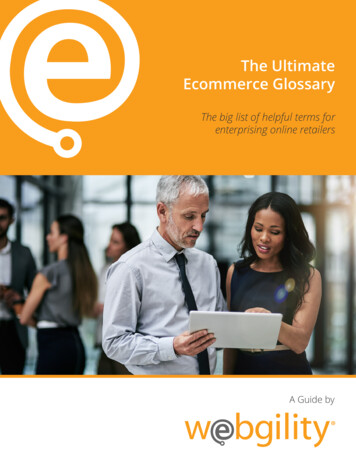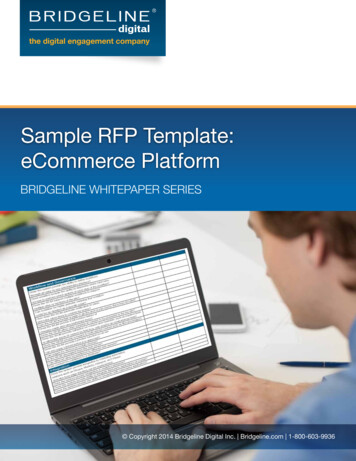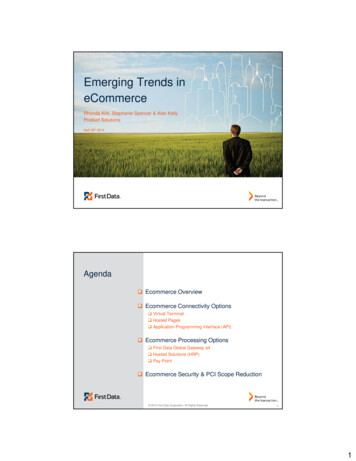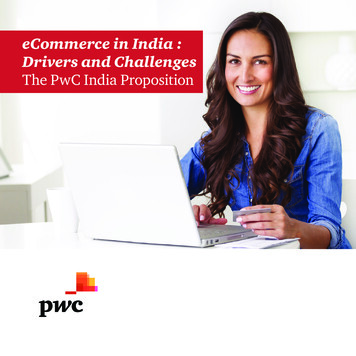
Transcription
eCommerce in India :Drivers and ChallengesThe PwC India Proposition
Indian eCommerce market to grow rapidlyas new growth drivers emergeCompanies will need to address challenges in this ever-evolvingmarketplaceAs one of the fastest growing sectors in India in recent years,the megatrends that will shape the eCommerce sector in thenear term are as follows:Geography and demography will play a critical role in thesector’s future growth. Tier II and III cities and small townshave begun contributing meaningfully to the eCommercepie and will be pivotal for future growth driven by a rapidlygrowing internet population and significantly low internetpenetration.Advancements in technology adoption such as the increasingproliferation of devices such as smartphones and tablets, andaccess to the internet through broadband, 3G/4G, etc. willfurther lead to increase in the online consumer base.Business models have been changing rapidly in theeCommerce sector largely due to heightened competition andthe inability of players to sustain high costs. Newer models 22 bnEstimated size ofIndia’s eCommercemarket by 2015such as private, white labels and drop-ship are also becomingpopular.Profitability (or the lack of it!) will be the single most criticalfinancial challenge.Key players continue to focus on building market share.Investor interest has also compelled players to adopt the grossmerchandize value (GMV)-driven approach compromisingprofitability.Consolidation in the near term appears inevitable.Players are aggressively rushing to build scale and those whocannot will likely be acquired. Common investors are alsopushing for mergers, alliances and partnerships among players.Increasing convergence of online and off line channels.Brands and brick-and-mortar retailers are increasinglyfocussing on ‘going online’. eTailers are setting up physicalstores in order to enhance the customer experience. 6 bnEstimated sizeof India’s eTailmarket in 2015
“Technological disruption has driven change in the eCommerce industry with shoppers embracing multipletouchpoints in their purchase journeys. Overall, there is humongous potential for the eCommerce companies helpedstrongly by a growing internet user base and advancements in technology. However, this will not be without its share ofchallenges –operational, regulatory, digital, etc. A company’s ability to prepare itself proactively to meet these challengeswill decide the difference between a successful venture and a failed one”- Sandeep Ladda, Technology Sector Leader, PwC IndiaKey challenges How do we scale up? Are our organizational systemsgeared to scale up or are they outdated? Do we have thetalent, processes and systems? How to rationalise customer acquisition costs? While thecustomer base is expanding, how do we build customerloyalty? Are there ways to better and cost effective ways toacquire customers than throwing mega discounts?How do we address the regulations that are stillevolving? How do we formulate compliance frameworksto address bribery and corruption issues? How do we control the last mile delivery? How do wemanage the customer delivery experience ? How do weovercome the poor supply chain infrastructure in Tier IIand III cities?How do we interpret the intricate tax norms andcomplex inter-state taxation rules? How to manage thewarehouse location and excellence planning? How do weaddress the issues of FDI in eCommerce? How to protect data and the integrity of the system thathandles the data and transactions? How do we come up with solutions enabling seamlessintegration of back-end and front-end infrastructure?How do we enhance the Digital experience of the usersonline and offline?While the growth in this sector excites entrepreneurs andfinancial investors alike, some serious challenges are beginningto weigh down on the sector. Following are some of thekey questions that eCommerce players are findingdifficulties with: How to manage payment costs – especially given highpreference for high Cash on Delivery (CoD)? How do wecontrol high return rates for COD?56 %Compounded annualgrowth rate of eTailmarket in Indiabetween 2008 – 2014350 mnEstimated no ofinternet users inIndia by 2015 (v.200 mn in 2013 )
eCommerce Drivers and Challenges
eCommerce players in India need to address eight key aspects oftheir business – both Internal and External Cyber law complianceInefficient anti-corruption frameworkFEMA contraventions and regularizationLegal exposure in agreements/arrangementsTax TechnologyBrand RiskInsider threatWebsite uptimeEmployee – Vendor nexusBribery and CorruptionSuppliers from OFAC, sanctionedcountriesSup-optimal warehouse taxplanningImbalance between FDI normsvis-à-vis adequate entity controlsInefficient holding/IPR/entitystructuresUncertainty around GST roadmap Rapidly evolving customer segments, productportfoliosPrivate/ white label strategy for marketsMarket intelligence; growth, size and shareMultiple customer engagement platforms ComplianceFrameworkProduct &MarketStrategy Customer/DigitalExperienceRisk, Fraud &Cyber SecurityTax &RegulatoryStructuring eCommerceDrivers andChallengesPayments &TransactionsOrganizationScalingKeeping organization design in pace withrapidly evolving business strategyEvolving roles, responsibilities and KRAsPerformance management andbenchmarkingLack of synergy between business,technology and operations functions ofthe enterpriseTransforming IT as an innovation hubFulfilment Customer experience – rich, freshand simple , not geared towardsdiscoveryLimited omni-channel options andexperienceInconsistent brand experienceacross platformsProliferation of technologiesSecurity and privacy breachFictitious TransactionsRBI restrictions for prepaidinstruments/e-walletsCross-border tax/ regulatoryissuesPhysical infrastructure lags growth atinternet speedHigh reverse logistics costLack of innovation-focused fulfillmentoptionsReverse logistics management
Our offerings cut across the eCommerce operating modelExternal forces impact how eCommerce companies plan their growth strategy and provideseamless customer experience onsite and post-transactionExternal ElementsProduct and MarketStrategyPwC Solutions Customer/DigitalExperience Payments &Transactions Fulfilment eCommerce Strategy Reviewand DefinitionBusiness and Category StrategyDefinitionWebsite Design Integration Operating Model DesignCustomer SegmentationLabel DeterminationCategory PlayUser Experience DesigneCommerce Technology eCommerce platform fordifferent business modelsConnected Experience FeedbackDigital Marketing and DealsBig Data AnalyticsOperationsEnabling SolutionsCyber - Transaction integrityservices (framework development)Forensics - Fraud Risk AssessmentsAnti Bribery and Corruption duediligence Tax - Commission vs Discount– Service tax / withholding taxapplicabilityRegulatory - FEMA exposureanalysis on back to back crossborder arrangementsNetwork Model DesignPartnership StrategyDisruptive DeliveryWarehouse Excellence Delivery Process ImprovementReverse LogisticsImplementation - prioritizedportfolio of initiatives and riskmitigation
We believe an industry-focussed and cross-functional approach isrequiredInternal forces impact how eCommerce companies can organise to drive and sustain growthPwC SolutionsInternal ElementsOrganization Scaling Tax & RegulatoryStructuringRisk, Fraud & CyberSecurity ComplianceFramework Organization DesignEmployee Value PropositionTalent Management andLeadership DevelopmentWorkforce Planning Indirect Tax - Warehouse locationplanning and Business ModelanalysisIncome Tax - Tax efficientjurisdiction for holding company,IP, website, platform, servers,operating / business models Security Strategy and GovernanceRisk and ComplianceThreat and VulnerabilityManagementPCI DSS Compliance Business Continuity PlanningIncidence ManagementMedia ManagementDirect Tax - Withholding taxcompliance frameworkIndirect Tax - ComplianceassistanceAnalyze schemes applicableunder indirect tax legislationsForensic Technology Legal - Agreement Review andJVA/Investment AgreementsIT - Compliance with Cyberlaws and PCI – DSSRegulatory - Seeking FIPB/RBI/ Government approvals Performance ManagementBest Practices ImplementationAcquisition Opportunities andFund RaisingEnterprise ArchitectureTax efficient entity/groupstructure, funding, etc.Regulatory - Obtaining RBIclarifications/special approvalunder PSS ActRegulatory - Business modelvalidation and Regularizationplanning
Our experience in this sector is unparalleledOur team brings together experience of working with some of thelargest clients across functionsWhy us? Just consider thisUndertook assessment, strategy, execution and launchof eCommerce store for a leading Technology companyAssisted one of the largest eCommerce companies inoverhauling its entire organisational structure from astrategic perspectiveCarried out compliance and diagnostic reviews forsome of the largest online marketplacesWe have carried out due diligence on all keyeCommerce companies on behalf of potentialinvestorsWe have helped a large retail brand is designingand implementing their e-retail strategy
Case Study 1Case Study 2Case Study 3Client’s problemClient’s problemClient’s problemClient was a leading fashion andapparel eCommerce player and wasfacing high procurement costs forprivate label products. The clientwas also burdened with slow movingand obsolete inventory due toimproper processes and controls.The client was engaged in operatinga home-shopping enterprise andoperated on an inventory basedmodel. However, the companywished to migrate to a commissionbased model and was evaluatingvarious considerations for thistransition.A leading eCommerce companywanted assistance with respect toregulatory guidance for variouse-payment products.Our workDeveloping a blueprint of processesfor the key functions in the p2pprocesses and SOXCreating SOP’s Defining and creating scorecards Training people on new processesTangible and measurableimpact Reduction of procurement costsfor private label products by 7% Slow moving and obsoleteinventory brought down by 10%resulting in reduction of overallinventory costsby 7%Our work Detailed understanding of theclient’s present as well as desiredbusiness model Study of projected costs underboth models and identified costsaving opportunities Identifying solutions forretention of features of thepresent model i.e. control overquality and delivery of productsand combos/free giftsTangible and measurableimpact Successful migration to thecommission based model Tax efficient and compliant Indiabusiness model and operatingstructureOur work Assisted the client in reviewingthe application to be made to theRegulator for seeking paymentsystem operator license Advised the client on regulatoryimplications / compliances inrespect of e-payments products tobe introduced in IndiaTangible and measurableimpact Client managed regulatoryexposures arising out ofe-payments Client also set up a robustinternal mechanism to managerisks
Our eCommerce Core teamHighly experienced practitioners with profound industryexperience, multi-disciplinary talentAshootosh ChandDigitalAshootosh has over 20 years ofindustry experience deliveringcloud, mobility, big data, social,smart sensors, based solutionsacross digital, eCommerce,CPG, etc.Sandeep LaddaPartner and India Technology Sector Leader Sandeep Ladda is the Leader of theTechnology Sector practice at PwC Indiaand is part of the Global Technology,Infocomm and Entertainment & Media(TICE) Leadership Team. He is a Partnerin the Tax and Regulatory Servicespractice of PricewaterhouseCoopersin India and serves clients in the TICEsectors. He has been with PwC for over9 years Sandeep has more than 18 years ofexperience in assisting various MNC’s in avariety of services offered by PwC acrossall the lines of services and for a numberof Technology companies and so also forother sectorsSumeer GoyalDigitalSumeer brings on board over 20 years ofsoftware development and technologymanagement experience. Prior tojoining PwC, Sumeer was the CTO atQuikr.com.
Our eCommerce Core teamContd.Meghana ReddyreddyTarun KumarNikunj SethAbhishek RastogiMilan ShahGopal Singh RanaHrishikesh SatheShamit MukherjeeRicha GuptaJigar MehtaOperationsInternal Audit - Risk Advisory ServicesDirect TaxDeals – Transaction ServicesLegalIT Risk Management (Cyber Security)Indirect TaxForensic ServicesFinance Function EffectivenessRegulatory Services
About PwCPwC helps organisations and individuals create the value they’relooking for. We’re a network of firms in 157 countries with morethan 184,000 people who are committed to delivering quality inAssurance, Tax and Advisory services. Tell us what matters to youand find out more by visiting us at www.pwc.com.In India, PwC has offices in these cities: Ahmedabad, Bangalore,Chennai, Delhi NCR, Hyderabad, Kolkata, Mumbai and Pune. Formore information about PwC India’s service offerings, visit www.pwc.com/inPwC refers to the PwC network and / or one or more of its memberfirms, each of which is a separate legal entity. Please see www.pwc.com/structure for further details.For updates on PwC india follow us on:Facebook: facebook.com/PwCIndiaTwitter: twitter.com/PwC INLinkedin: linkedin.com/company/pwc-indiaYoutube: youtube.com/pwcContactsSandeep LaddaPartner and India Technology Sector LeaderPwC HousePlot No. 18 A, Bandra, Mumbai, Maharashtra, India - 400 050T: 91 (22) 6689 1444M: 91 98202 63630E: sandeep.ladda@in.pwc.comwww.pwc.inData Classification: DC0This publication does not constitute professional advice. The information in this publication has been obtained or derived from sources believed byPricewaterhouseCoopers Private Limited (PwCPL) to be reliable but PwCPL does not represent that this information is accurate or complete. Any opinions orestimates contained in this publication represent the judgment of PwCPL at this time and are subject to change without notice. Readers of this publication areadvised to seek their own professional advice before taking any course of action or decision, for which they are entirely responsible, based on the contents ofthis publication. PwCPL neither accepts or assumes any responsibility or liability to any reader of this publication in respect of the information contained withinit or for any decisions readers may take or decide not to or fail to take. 2015 PricewaterhouseCoopers Private Limited. All rights reserved. In this document, “PwC” refers to PricewaterhouseCoopers Private Limited (a limitedliability company in India having Corporate Identity Number or CIN : U74140WB1983PTC036093), which is a member firm of PricewaterhouseCoopersInternational Limited (PwCIL), each member firm of which is a separate legal entity.AK 301 - January 2015 eCommerce in India : Drivers and Challenges.inddDesigned by Corporate Communications, India
Our team brings together experience of working with some of the largest clients across functions Why us? Just consider this Undertook assessment, strategy, execution and launch of eCommerce store for a leading Technology company Assisted one of the largest eCommerce companies in overhauling its entire organisational structure from a

